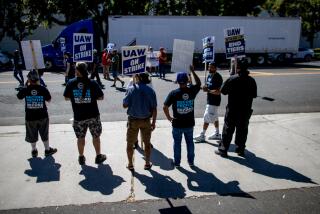Clinton Calls for End to Strike as GM Nears Shutdown
- Share via
DETROIT — General Motors Corp. neared a total shutdown of its vehicle production Friday as President Clinton called on the company and striking auto workers to settle their differences quickly.
Clinton, who has no power other than persuasion to end the strike, was careful not to take sides in the widening dispute that could adversely affect the nation’s economy if it continues for several more weeks.
Both GM and the United Auto Workers have legitimate and substantial differences, Clinton said in remarks to reporters before a meeting with his economic advisors.
“I think they can work it out and I hope they do it in a timely fashion,” said Clinton, who is being kept abreast of developments by Labor Secretary Alexis Herman.
No progress was reported Friday by negotiators meeting in Flint, Mich., where 9,200 workers at two parts plants are on strike. Talks are expected to continue through the weekend.
The 14-day dispute has forced GM to close 23 of its 29 assembly plants and scores of component plants in North America. The strikes have idled 105,500 workers and shut down more than 90% of GM’s assembly operations.
The strike is costing GM an estimated $50 million a day. The losses could mount to more than $65 million a day next week as more plants are shuttered. The lost production could slow the economy slightly in the second quarter, although most could be made up after the settlement, economists said.
Negotiations are complicated by the UAW national convention, which begins Monday in Las Vegas, and a scheduled two-week vacation shutdown of GM’s plants beginning the following week.
Labor experts said the outlook for a quick settlement is dim, and the dispute is likely to last at least into mid-July and possibly longer.
The dispute revolves around the union’s concerns about job security and GM’s drive for greater production efficiencies. GM has faced 13 local strikes in the last three years over similar issues.
GM Chairman John F. Smith Jr., appearing Friday at a graduation ceremony at Kettering University in Flint, said he was aware of the pain the labor dispute was causing employees, dealers, customers, suppliers and shareholders.
But he said that GM must have an agreement with the union “that allows us to meet the demands of this changing marketplace.” Smith said global competition requires the company to become more efficient.
GM shares fell $2.06 to close at $67.50 on the New York Stock Exchange.
Despite the production cutbacks, most dealers report adequate supplies of most vehicles. But there are spot shortages of hot-selling vehicles such as the Chevrolet Suburban and Tahoe sport-utilities, and inventories could rapidly tighten if the strikes continue into July.
Frank Ursomarso, a Chevy dealer in Wilmington, Del., said that his inventories are about half of what he likes entering the summer selling season and profit would be hurt with a prolonged walkout. But he supports management’s tough stance against the union.
“GM has resolved to solve the problems they have at those plants,” Ursomarso said. “GM won’t back down. This thing is going to be longer rather than shorter.”
The UAW is equally hardened in its position. Union leaders argue that GM has reneged on a promise to invest $300 million in the stamping plant and wants to cut 200 jobs. The second plant is facing a loss of 2,500 jobs that GM wants to ship to outside suppliers or Mexican factories.
GM argues that both plants are not competitive. It has invested $120 million in the stamping plant, but claims the union has balked at agreed-upon work-rule changes to run equipment more efficiently. The other plant makes low-technology parts, such as oil filters and spark plugs, which can be made cheaper elsewhere, the company said.
“At the end of the day, this is all about jobs,” said Joseph Phillippi, analyst with Lehman Bros. “It’s a test of wills that could go on for some time.”






